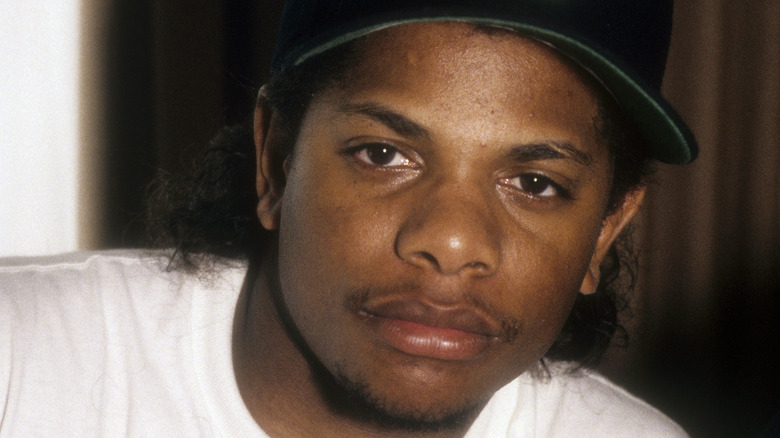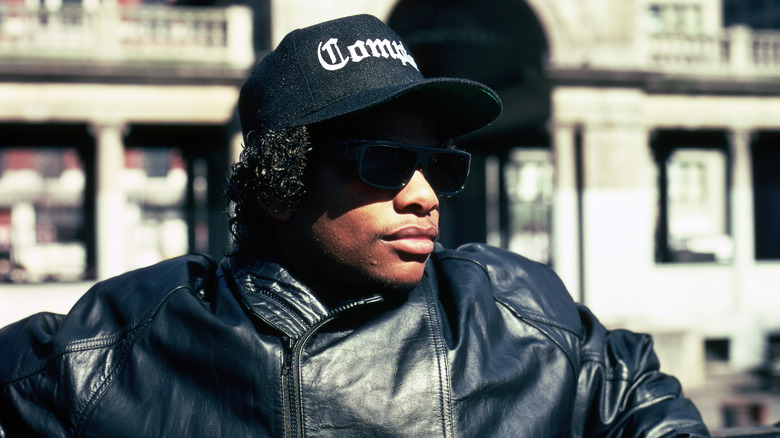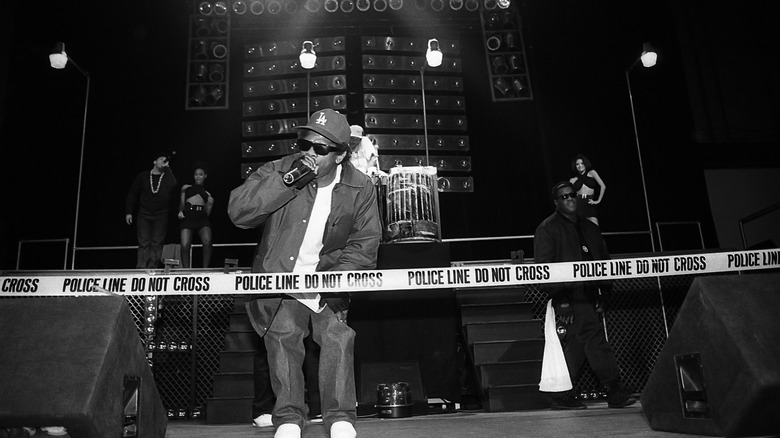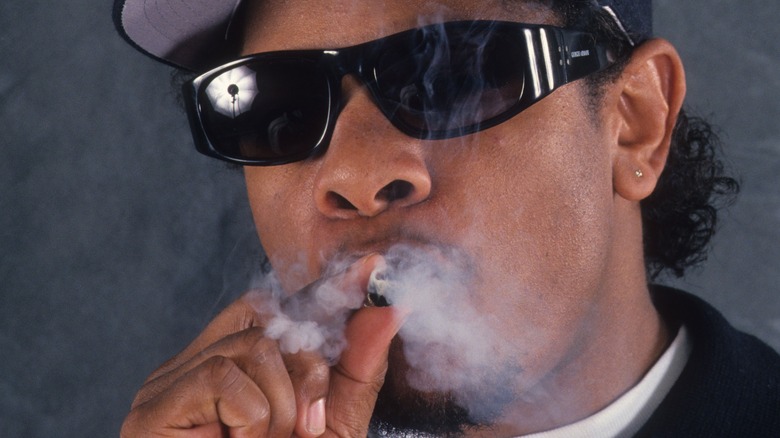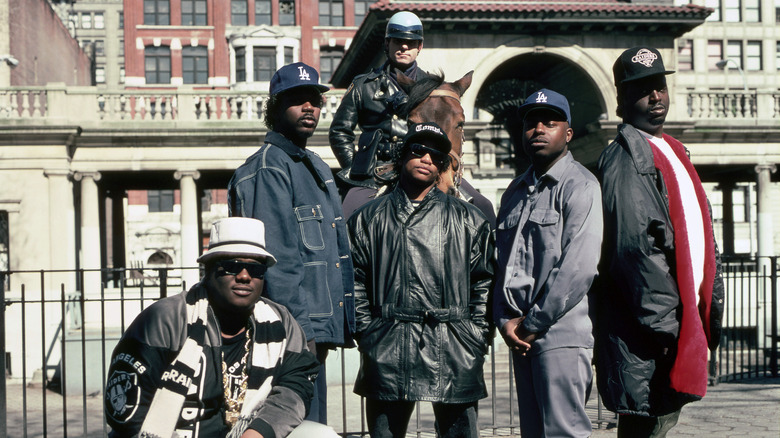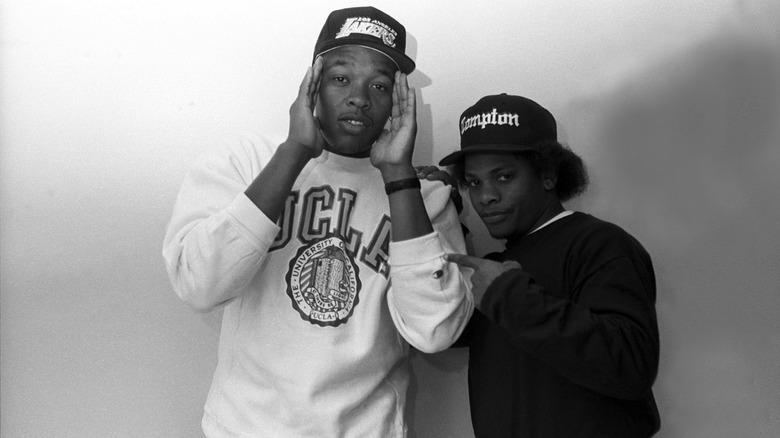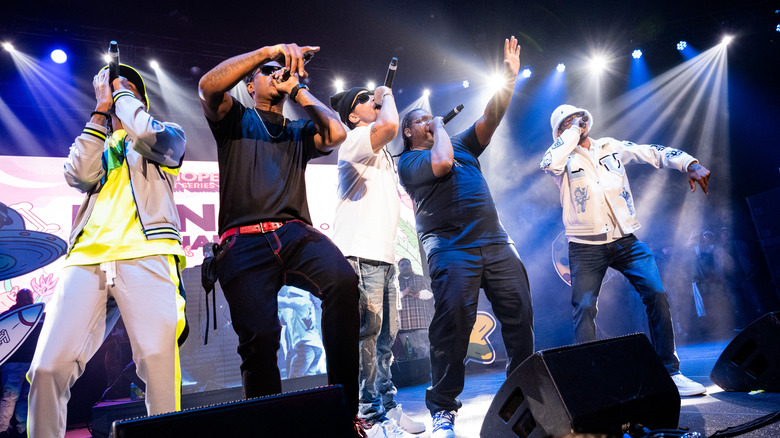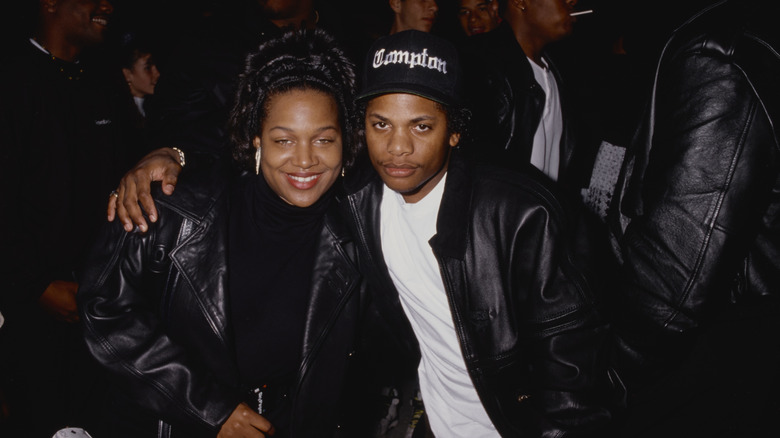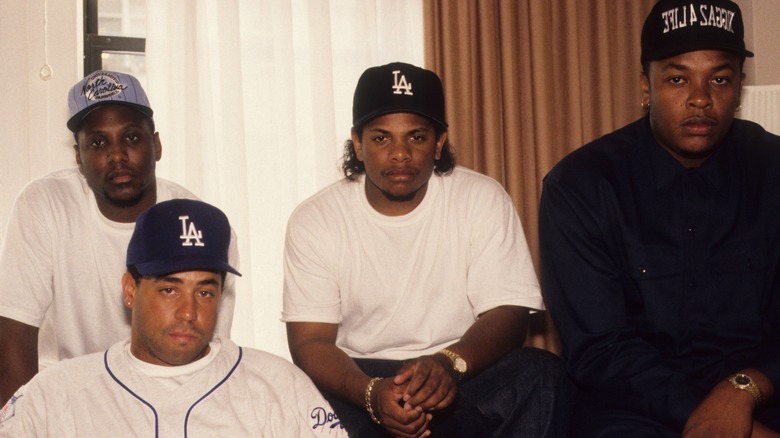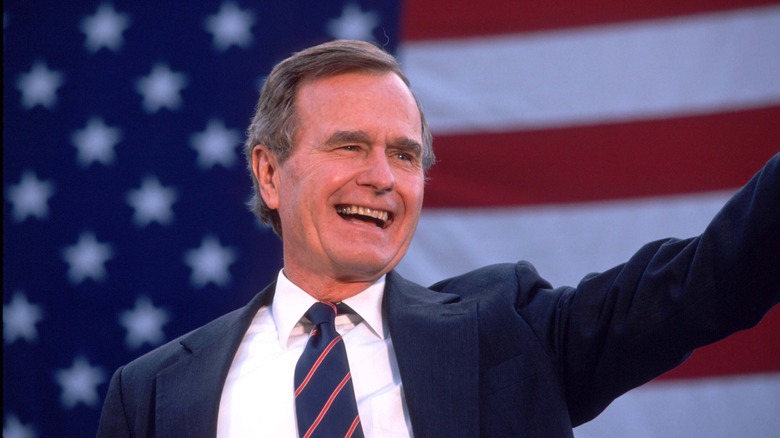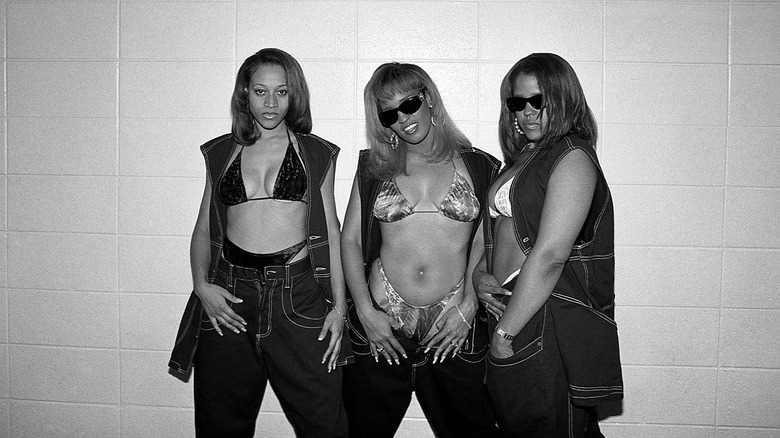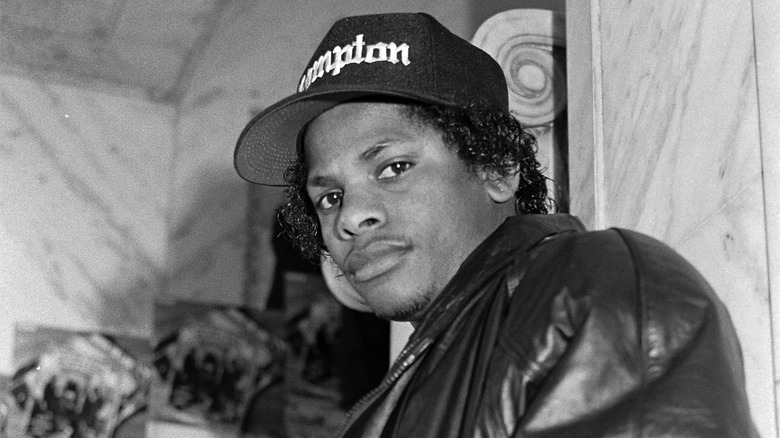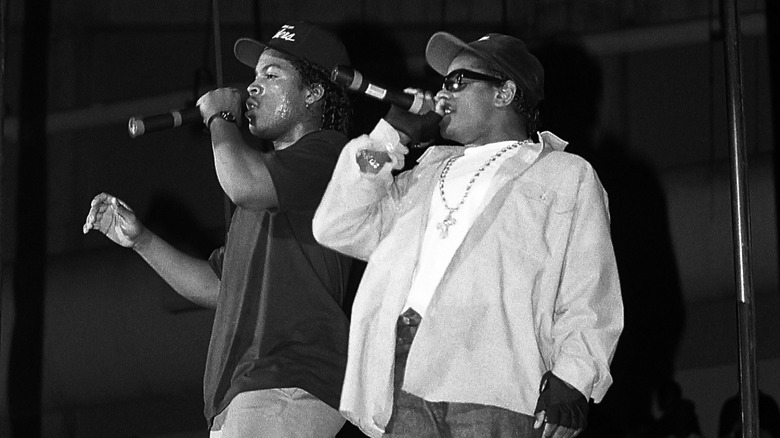Eazy-E: Facts About The Rapper Gone Far Too Soon
Without a doubt, rap would not be the same without the contributions of Eazy-E since the revolutionary genre barely existed before he came on the scene. Not only was he one of the founding members of the supergroup N.W.A., but the talented entrepreneur kickstarted the careers of many others in the music industry during the early 1990s (via Biography).
The rapper's rise did not come easy on the mean streets of Compton, as he was influenced by his surroundings to adopt rather unconventional — and quite illegal — means to survive. Eazy then used those skills he acquired in a world filled with drugs and gangs to break out of the mold and become a mainstream success story, as detailed in "Parental Discretion Is Advised: The Rise of N.W.A and the Dawn of Gangsta Rap." Before Eazy's death in 1995, he made such a significant impact that his southern L.A. hometown will always be remembered because of his impressive achievements.
He dropped out of high school to make his own way
Even though Eric Wright had loving parents who supported him, in the city of Compton where he grew up, it was also impossible to avoid the world of drugs and gang warfare that surrounded him. So, Wright became Eazy-E as a way to survive and make his own way in the dangerous area just south of Los Angeles.
To begin to tread down his independent path, Eazy-E dropped out of Dominguez High School during his sophomore year, according to Gerrick D. Kennedy's, "Parental Discretion Is Advised: The Rise of N.W.A and the Dawn of Gangsta Rap." He later earned his GED instead of getting a diploma, as the aspiring rapper did not see his future in academics. By the mid-1980s, Eazy was taking the first steps in pursuing his dreams by recording music in his parent's garage, says The New York Times.
Eazy-E had to fight to survive the streets
Eazy-E may have been short in stature, but he certainly could take care of himself on the volatile streets of Compton. In the book, "Parental Discretion Is Advised: The Rise of N.W.A and the Dawn of Gangsta Rap," legendary rap radio host Greg Mack explained, "That boy could fight. He's all muscle. If he locked on to you, you're in trouble."
But since the 5-foot-4-inch future rap god was not very tall, he had to prove himself plenty of times, which permanently left its mark on his body. Mazik Saevitz, a rapper who was later signed under Eazy's record label, described how he could tell his boss had a rough past, saying, "If you looked at [his] knuckles, they were gone. They were dimpled."
Eazy did thrive in the gang culture of southern Los Angeles, yet on the other hand, he never joined one of the gangs. The Crips were the ones who operated where he lived, and even though he got along with several of them, he managed not to get fully pulled into their lifestyle and business practices.
Jerry Heller believes the dope dealer image was mostly armor
Eazy-E was often associated with selling drugs, which he not only openly admitted to but also actively promoted. After leaving high school, the young entrepreneur became a dealer to make a living and was the most successful kind: one that did not use his own product, says Gerrick D. Kennedy in his book, "Parental Discretion Is Advised: The Rise of N.W.A and the Dawn of Gangsta Rap." In fact, he was so good at dealing that it gave him the funds to start his own record company, Ruthless, according to The Source (via The New York Times).
However, Jerry Heller, the manager of N.W.A. and co-founder of Ruthless, had quite a different perspective. In his book, "Ruthless: A Memoir," he said, "I think now that the whole 'dope dealer' tag was part of Eric Wright's self-forged armor. The hood where he grew up was a dangerous place. He was a small guy. 'Thug' was a role that was widely understood on the street; it gave you a certain level of protection in the sense that people hesitated to f*** with you."
Heller based this belief on their conversations, and the fact that he never witnessed Eazy sell drugs to anyone in the several years they worked closely together. So, regardless of how involved he was in the illicit trade earlier in life, the rapper certainly gave it all up to pursue his music career.
Eazy-E's cousin got him into and out of the drug game
Whether Easy-E's involvement with selling drugs was exaggerated or not, there is no doubt that he did work for a dealer as a teen. Eazy began at the bottom of the drug trade working as a "runner" for his older cousin Horace Butler, which basically meant he was the delivery guy for the product after the deals went down, says Gerrick D. Kennedy in his book, "Parental Discretion Is Advised: The Rise of N.W.A and the Dawn of Gangsta Rap."
The apprentice worked for his cousin until tragedy struck, as often does in the drug trade. While driving towards the I-10 freeway in mid-city L.A., Butler was gunned down in his truck and did not survive the shooting. The murder made a profound impact on Eazy, and it was not lost on him how close he also came to dying in the same brutal way. He later said (via "Original Gangstas"), "Me and him used to be together every day. I just happened to go off and do some business with my mother that night, and I wasn't there. I figure I was there, I'd probably be dead right along with him." The rapper may not have left that world immediately but the painful event led him to focus most of his energy on other business pursuits like music.
He bailed Dr. Dre out of jail to start Ruthless Records
Before N.W.A. was formed, Andre Young, a.k.a. Dr. Dre, knew who Eazy-E was because the two lived in the same area. Eazy was especially hard to miss in the neighborhood as he rode around on his prized Suzuki Samurai. However, they were not friends yet at this point and were basically strangers, so neither had any idea that they shared such similar aspirations.
That all changed once Eazy discovered Dre's mixtapes in a pile of records that were sold at a stall he frequently visited in search of new music, says Gerrick D. Kennedy in his book, "Parental Discretion Is Advised: The Rise of N.W.A and the Dawn of Gangsta Rap." Afterward, Eazy was persistent in his attempts to reach out to Dre and collaborate with him. It was not long until the duo was recording beats in Eazy's garage.
Over time though, Eazy had bigger dreams than just making records at his home, so when Dre found himself locked up in jail and called his new friend, the ambitious rapper took advantage of the situation. Eazy told Dre, "Sure, I'll post your bail. But you got to do something for me." Once Dre was free, Eazy was then able to convince him to begin work on the foundation of what would later become Ruthless Records.
Ruthless became one of the most successful independent labels ever
Eazy-E's success is often associated with the popularity of N.W.A., but the rap supergroup was not the only act that led his label, Ruthless Records, to become one of the greatest of all time. That is not to say N.W.A. wasn't responsible for sparking it all, especially with their album, "Straight Outta Compton," reaching platinum status by 1990. Yet, even after serious disagreements arose, leading to the departure of two major members, Dr. Dre and Ice Cube, Eazy still managed to make his label able to compete with the major studios.
Eazy had help from his business partner, Jerry Heller, who knew the industry well after working with stars like Elton John and Pink Floyd. Together, the two were able to increase the value of Ruthless to nearly $30 million by the time of the rapper's death in 1995, says Ben Westhoff in his book, "Original Gangstas." Along with his own solo hits, Eazy's studio signed many other musicians, including Bone Thugs-NHarmony and MC Ren. Through contracts Dre signed before he left, Ruthless was also still getting royalties from his work, according to Swindle Magazine. It took a massive amount of dedication. In his book, "Ruthless: A Memoir," Heller described what it was like for the duo and said, "Our old 'one record at a time' philosophy fell by the wayside. In the wake of 'The Chronic,' Eazy and I juggled twenty-nine separate, simultaneous projects at Ruthless."
Eazy-E loved to party with women
Eazy-E has often been praised for his impressive business acumen and rap skills, but the entertainer had his flaws as well, including his addiction to sex. In his book, "Ruthless: A Memoir," Jerry Heller explained, "Even before Ruthless kicked into high gear, he had multiple girlfriends." His partner then added, "He was so smart in every other way. Women were his Achilles' heel. I couldn't believe that a guy with so few other weaknesses indulged himself in such a huge one."
Heller was far from the only one to comment on this very public aspect of Eazy's lifestyle. The two rappers of Blood of Abraham, Mazik Saevitz and Benyad "Ben" Mor, happily spent a lot of time with their new boss after signing with Ruthless, which often meant partying at strip clubs or at one of his mansions, says Swindle Magazine. Sometimes they were accompanied by porn stars as well. Eazy almost always brought someone home afterward, and while Saevitz was living at his mansion in Calabasas, he awkwardly had to help several of Eazy's guests get home long after he had already left.
Journalist Allen Gordon received $700 from Eazy-E for college
Once Eazy-E's career took off and he began to rake in millions, he definitely had fun with his new level of income. In his book, "Original Gangstas," Ben Westhoff listed off multiple vehicles that the rapper owned, on top of a few separate homes in Norwalk, Calabasas, Woodland Hills, and Topanga.
But after years of lavish spending, his priorities changed later in life, and he became considerably more philanthropic with his money. Not only did the rapper donate thousands of dollars to children's charities, but his giving had a more personal aspect to it as well by sending inner-city kids to Disneyland. He was also one of the first rap stars to distribute turkeys to the public on Thanksgiving, according to Swindle Magazine. Yet, one of his most kind contributions to a single individual was the gifting of $700 to Allen S. Gordon, which was used to start his successful career in journalism.
Eazy-E supposedly supported George Bush Senior because of the success in the Gulf War
Oddly enough, when The National Republican Senatorial Committee held a luncheon as a ”Salute to the Commander in Chief" in 1991, Eazy-E was one of the honored guests at the event. All the donations the rapper made to L.A.-based charities did not go unnoticed by the conservative lawmakers who hoped that they could also receive some of those funds for their own campaigns, according to Entertainment Weekly. Publicly, Eazy seemed more than happy to attend, as a spokesperson said the rapper "really loves the President. He thinks he's a great humanitarian and that he did a great job with Desert Storm."
Jerry Heller, on the other hand, gave a behind-the-scenes perspective on why both he and Eazy thought it was such a great idea to go to the political gathering. In his book, "Ruthless: A Memoir," Heller recalled the conversation he had with his business partner about the strange invitation and the devious smile Eazy had as he said they should go. Heller continued, "As soon as he said it, the idea struck me like a lightning bolt. Yes! I thought. Brilliant! George Bush hosting the leading proponent of gangsta rap for lunch!" He then added, "A million dollars' worth of publicity for a hundredth of the price."
He wanted H.W.A. to act like Sharon Stone when with record executives
Among the various artists signed by Eazy-E was the all-female group H.W.A., short for Hoez With Attitude, who gained his attention after the release of their first record, 1990's "Livin' in a Hoe House." According to AllMusic, the notorious rappers did not earn much in sales under their new label, especially since they only had one album, "Az Much Ass Azz U Want," released by Ruthless in 1994. But the group did spark a lot of controversy in the media stemming from their lyrics and public behavior, including criticism from director Spike Lee and Reverend Calvin Butts.
As Jerry Heller revealed in his book, "Ruthless: A Memoir," behind the scenes, Eazy encouraged the lewd conduct of the performers and tried to use it to the label's advantage for better business deals. "Eric used to unleash H.W.A. on record executives," he wrote. Then, he would advise them to "Sharon Stone" them, "referring to the crotch-flashing episode in 'Basic Instinct.'"
Eazy-E was buried in a gold coffin
Throughout his life, Eazy-E had his own style and that was no different after his death. After Eazy-E's premature death in 1995, his memorial service was a huge event attended by over 3,000 friends, family members, and fans, along with many others either associated with the southern L.A. community or the music industry, as reported by the Los Angeles Times. In front of such a massive crowd, the godfather of rap made sure the ceremony would have his distinctive look.
For the occasion, Eazy's body was still dressed in his favorite Compton hat, Pendleton shirt, and jeans, says Ben Westhoff in his book, "Original Gangstas." And while the rapper's funeral attire may not have been flashy, the same could not be said of his casket. Not only was the impressive coffin covered in gold, but Eazy-E was also buried with layers of white roses and lilacs.
Jerry Heller believes Eazy-E never forgave Ice Cube
For as famous as N.W.A. was in its rise to mainstream prominence, the group's falling out was almost more well-known because of the bitter fights that resulted afterward. The most notorious disputes occurred between Eazy-E and first Ice Cube, and then with Dr. Dre, who left N.W.A. in 1989. Supposedly, Eazy reconciled with both men near the end of his life, but Jerry Heller claimed that was not necessarily the case.
While Eazy may have been on somewhat good terms with Dre before his passing, Heller believed that irreparable damage had been done to his relationship with Ice Cube, who left N.W. A. in 1989. In his book, "Ruthless: A Memoir," Heller said, "Cube claimed that, after he left Ruthless, he eventually mended fences with Eric. He spoke about a time Eric and he got together in New York City. But I know for a fact that Eric Wright never forgave O'Shea Jackson for what he perceived as ingratitude." Then, speaking directly to Ice Cube, Heller continued, "When you saw Eric in New York during the winter of 1994, he was playing you. Playing the playa. He never changed his mind about what a punk he thought you were."
